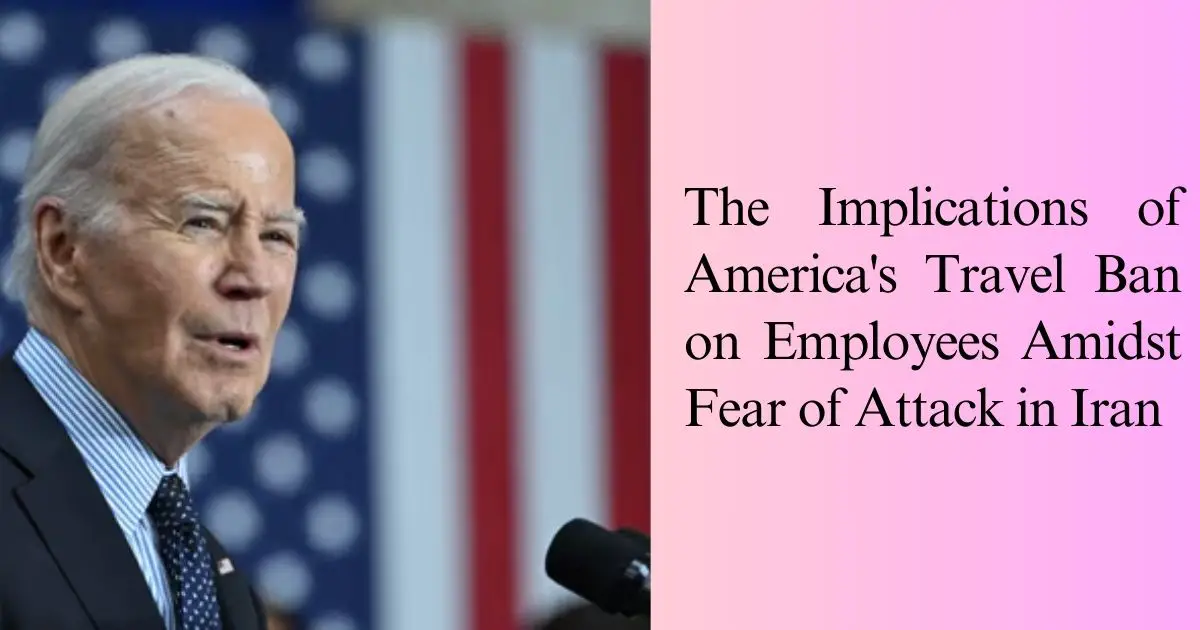Amidst this backdrop, the fear of potential attacks has led to significant repercussions, not only in terms of international relations but also in the realm of individual freedoms and mobility. One such instance is the American ban on travel for employees in Iran during periods of heightened threat perception. This essay aims to delve into the complexities surrounding this issue, examining the rationale behind such measures, their impact on individuals and organizations, and the broader implications for diplomacy and security.
Rationale behind the Travel Ban
The decision to impose a travel ban on employees in Iran reflects the prioritization of safety and security concerns by American authorities. Given the history of strained relations between the two nations, heightened tensions often coincide with increased risks for American citizens residing or traveling in Iran. The U.S. government, therefore, perceives it as a precautionary measure to mitigate potential threats and safeguard the well-being of its citizens abroad.
Moreover, the imposition of travel restrictions serves as a deterrent against hostile actions by signaling a firm stance against any form of aggression or terrorism. By limiting the mobility of employees in Iran, the U.S. aims to disrupt any nefarious plans that may be orchestrated against its interests or personnel in the region. This proactive approach aligns with broader national security objectives aimed at preempting and neutralizing potential threats before they materialize.
Impact on Individuals and Organizations
While the travel ban may be justified from a security standpoint, its implementation carries significant implications for individuals and organizations operating in Iran. For employees, especially those engaged in diplomatic, commercial, or humanitarian activities, the restriction on travel curtails their ability to fulfill professional obligations and responsibilities effectively. It disrupts routine business operations, hampers cross-cultural exchanges, and impedes efforts aimed at fostering mutual understanding and cooperation between nations.
Furthermore, the travel ban imposes logistical challenges and personal hardships on affected individuals and their families. It restricts their freedom of movement, limits access to essential services and resources, and may even jeopardize their employment status or career prospects. The uncertainty surrounding the duration and extent of the ban exacerbates feelings of anxiety and insecurity, compounding the already stressful nature of living in a volatile geopolitical environment.
From an organizational perspective, the travel ban poses operational hurdles and strategic dilemmas for companies with a presence in Iran. It disrupts supply chains, complicates project management, and undermines business continuity efforts. Moreover, the perceived risk associated with operating in a politically sensitive region may deter potential investors, stifle economic growth, and impede efforts to foster cross-border trade and investment.
Broader Implications for Diplomacy and Security
Beyond its immediate impact on individuals and organizations, America’s travel ban on employees in Iran carries broader implications for diplomacy and security in the Middle East and beyond. It underscores the fragility of international relations and the challenges inherent in managing conflicts and crises in a globalized world. The imposition of travel restrictions reflects a unilateral approach to addressing security concerns, which may strain diplomatic ties and exacerbate existing tensions with Iran and other affected nations.
Furthermore, the travel ban complicates efforts to de-escalate tensions and promote dialogue as a means of resolving conflicts peacefully. By limiting the avenues for engagement and exchange, it fosters a climate of mistrust and animosity, making it harder to find common ground and pursue mutually beneficial outcomes. This, in turn, perpetuates a cycle of confrontation and retaliation, undermining efforts to achieve lasting peace and stability in the region.
Moreover, the travel ban sets a precedent for other countries to adopt similar measures in response to perceived threats, thereby fueling a downward spiral of restrictions and reprisals. This tit-for-tat dynamic not only escalates tensions but also erodes the principles of freedom of movement and international cooperation enshrined in various multilateral agreements and conventions. It reinforces a zero-sum mentality that prioritizes security interests over individual liberties, thereby undermining the very values that underpin a free and open society.
Conclusion
In conclusion, America’s travel ban on employees in Iran amid fears of attack reflects the complex interplay of security considerations, diplomatic imperatives, and individual rights. While ostensibly aimed at safeguarding the welfare of American citizens and deterring potential threats, the ban carries significant ramifications for individuals, organizations, and broader geopolitical dynamics. It underscores the challenges of navigating a volatile and uncertain world, where competing interests and ideologies often collide. Moving forward, it is imperative to strike a delicate balance between security imperatives and respect for fundamental freedoms, recognizing that sustainable peace and stability can only be achieved through dialogue, cooperation, and mutual understanding.

